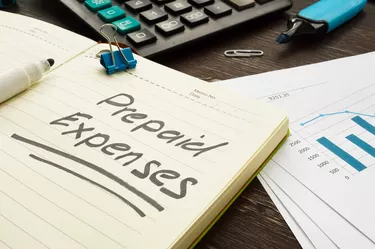
Prepaid expenses are the result of advanced cash payments for expenses that a company will incur over multiple accounting periods in the future. Companies adjust prepaid expenses periodically to reflect the part of the prepaid expenses incurred over time. If prepaid expenses are not adjusted, they will be overstated and the expenses actually incurred understated. A misrepresentation of prepaid expenses and incurred expenses will have an impact on both the balance sheet and the income statement. This also causes problems with things like future forecasting and financial planning.
Prepaid Expenses as Incurred Expenses
Video of the Day
According to Investopedia, prepaid expenses become incurred expenses either with the passage of time or through consumption. Examples of prepaid expenses include annual insurance payments and prepaid rents that expire with time, or office supplies that last for multiple accounting periods and expire by uses.
Video of the Day
When companies purchase prepaid expenses, they debit prepaid expense and credit cash. The original amount of prepaid expenses decreases as portions of the prepaid expenses are charged into actual expenses when incurred in the future. It is vital to record when actual expenses occur in order to gain an accurate financial picture in terms of what is happening within the company.
Balance-Sheet Asset Basics
The Corporate Finance Institute reports that a prepaid expense is not an expense item as the term implies but rather an asset reported on the balance sheet. The debiting of prepaid expense to record the prepayments for future expenses increases the account balance of the prepaid expense as an asset.
Over time, when companies resort to the asset of prepaid expenses to cover future expenses, the balance in the account of prepaid expense should decline accordingly. However, without making any adjustments for prepaid expenses, the account balance stays as originally recorded, overstating the value of prepaid expenses as an asset. This can cause assets to become inflated, which causes problems with budgeting, but also at tax time.
Consider Also: Why Learn Accounting
Income-Statement Expense Items
Expenses incurred in future accounting periods out of prepaid expenses are reported as expense items in the income statement. Since companies have prepaid for the expenses that they will incur in the future, there won't be any transactions linked to the incurrence of expenses during any of the future accounting periods. Without an accompanied business transaction, companies sometimes may forget to record and report an expense after having incurred it. The omission of such expense adjustments understates the amount of expense in the income statement.
Consider also: Debit vs. Credit in Accounting
Adjusting Accounting Entries
Companies use adjusting entries at the end of an accounting period to adjust prepaid expenses and record the expenses incurred. This helps to ensure that assets do not appear inflated at a later date. The adjusting entries are a credit entry to the account of prepaid expense on the balance sheet and a debit entry to the expense account on the income statement. The credit adjustment reduces the account balance of the prepaid expense and the debit adjustment increases the expense incurred. With the adjustments, prepaid expense as an asset on the balance sheet and the expense incurred and reported on the income statement are appropriately stated to their correct balances.